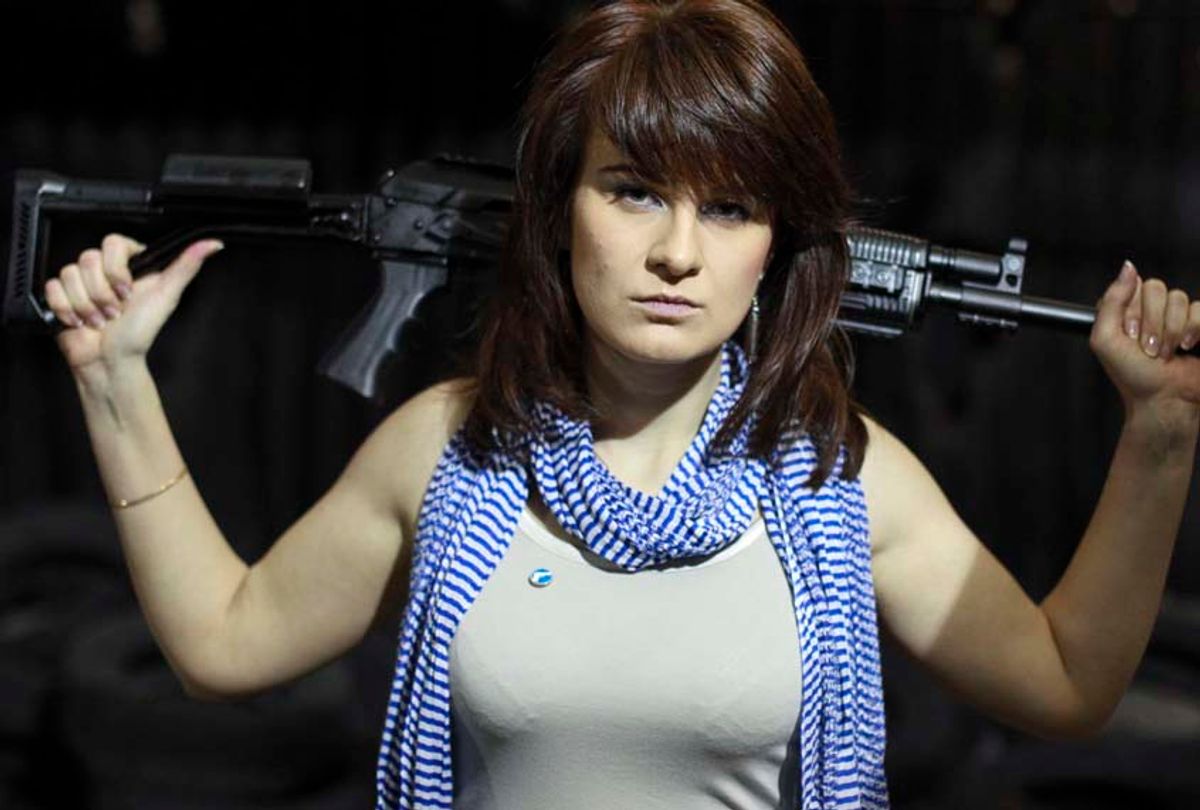Maria Butina, a 30-year-old gun rights activist who has been accused of being a Russian spy and trying to infiltrate conservative politics, has pleaded guilty for conspiring to act as an illegal foreign agent in the U.S., the Washington Post reports.
She was charged in federal court in July with working as an agent of the Russian government without being registered as such. On Monday, Butina agreed to plead guilty to conspiracy charges and cooperate with federal prosecutors in ongoing investigations. Multiple news outlets have reported that Butina's alleged cooperation will mostly focus on uncovering the role of Paul Erickson, a Republican operative with whom Butina had a romantic relationship.
In her plea deal, Butina admitted that she and "US Person 1," referring to Erickson, "agreed and conspired, with a Russian government official," whose description matches Russian banker and close Putin ally Alexander Torshin, for Butina to "act in the United States under the direction of Russian Official without prior notification to the Attorney General."
Under Torshin's direction, the document said, Butina "sought to establish unofficial lines of communication with Americans having power and influence over U.S. politics." The agreement notes that Butina admitted that, with Erickson's help, she drafted a proposal called "Description of the Diplomacy Project" in March of 2015, in which she wrote that she had "laid the groundwork for an unofficial channel of communication with the next U.S. administration."
Butina entered the U.S. in August 2016 on a student visa to study international relations at American University. The affidavit from July claimed that she had corresponded with a Russian official using email, Twitter and other electronic means.
"BUTINA'S efforts in the United States to promote the political interests of the Russian Federation were diverse and multifaceted," the affidavit explained, "including BUTINA'S efforts to organize a series of 'friendship and dialogue' dinners, some of which are believed to have taken place in the District of Columbia, as well as BUTINA'S attendance at two National Prayer Breakfasts in the District of Columbia."
In 2015, Butina organized a trip for former National Rifle Association (NRA) presidents and officials to Moscow, where she arranged a meeting for them with Russian Foreign Minister Sergey Lavrov. "We should let them express their gratitude now," she wrote to Torshin after the meeting. "We will put pressure on them quietly later."
Around the same time, Erickson appears to have known about Butina's work and was helping her establish connections. "Unrelated to specific presidential campaigns," Erickson wrote in October 2016 in an email to an acquaintance now in possession of the FBI. "I've been involved in securing a VERY private line of communication between the Kremlin and key [unnamed political party] leaders through, of all conduits, the [unnamed gun-rights organization]."
FBI investigators raided Erickson's South Dakota home and found a note in which he mused, "How to respond to FSB offer of employment?" The FSB is Russia's intelligence agency and the successor to the infamous KGB.
Butina continued to attend "friendship dinners" with prominent conservatives and later arranged for a group of Russians to attend the National Prayer Breakfast in February of 2017. In an email to Erickson, Butina wrote that the Russians were coming to the breakfast "to establish a back channel of communication," The Daily Beast reported.
Erickson sent the list of Russian attendees to another person and wrote, "Reaction to the delegation's presence in America will be conveyed DIRECTLY" to Russian President Vladimir Putin and Lavrov. As these efforts were ongoing, the NRA was breaking spending records with sums of cash never before seen from the group.
The NRA, relying on an arm of the group that is not required to disclose its donors, spent more than $30 million to elect President Donald Trump — nearly triple the $12.5 million they spent to help Republican nominee Mitt Romney in 2012. They spent $54 million in total to elect Republicans in 2016.
Since the 2016 election, the NRA has cut its spending drastically. During the 2018 midterm cycle, McClatchy reported that the NRA had spent just $1.6 million to help Republicans — about 10 percent of the $16 million the group had spent backing GOP candidates in the 2014 midterms.
But the NRA did not just spend a lot of money to help Trump win. Watchdog groups filed a complaint with the Federal Election Commission accusing the NRA and the Trump campaign of illegally coordinating ads to influence the 2016 election. According to The Trace, both the NRA and Trump campaign illegally coordinated to the point where their ad buys were authorized by the same person at the National Media Research firm.
"This is very strong evidence, if not proof, of illegal coordination," Larry Noble, a former FEC general counsel, told The Trace. "This is the heat of the general election, and the same person is acting as an agent for the NRA and the Trump campaign."
After Trump's election win, Butina reportedly wrote to Torshin, "I am ready for further orders."
Butina was arrested earlier this year. Erickson appears to be facing the threat of prosecution himself. Torshin, meanwhile, appears to have been forced into retirement — just as Butina appeared to be reaching a plea deal with prosecutors to admit she acted as an agent on his behalf. The Russian central bank issued a one-sentence statement on Torshin's retirement and declined to elaborate.
Butina has not yet been prosecuted by special counsel Robert Mueller, who is investigating allegations of collusion between the 2016 Trump campaign and the Russian government. Her story, however, links the Trump campaign to the National Rifle Association (NRA). She faces a maximum of five years in prison and will likely be deported after serving any time.



Shares